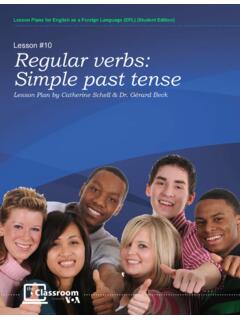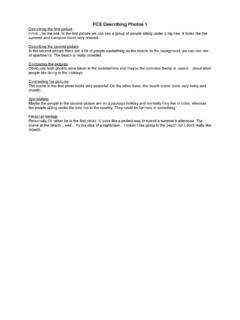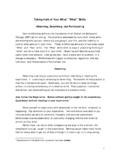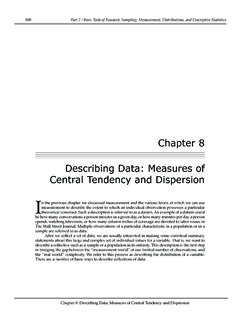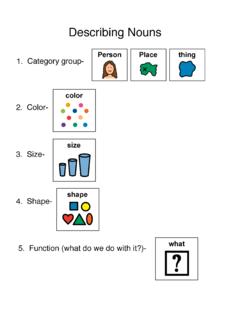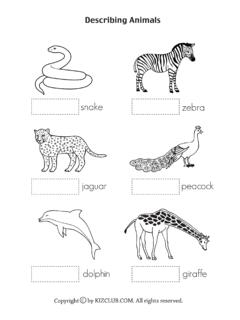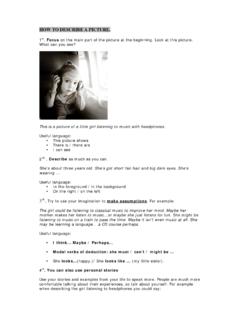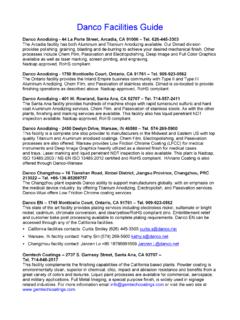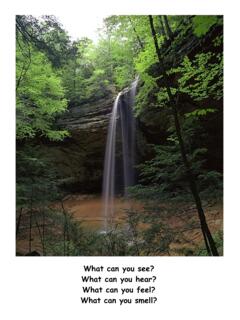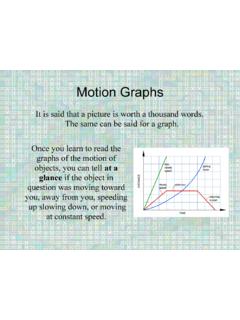Transcription of Lesson #2 Describing People - Voice of America
1 Lesson Plans for English as a Foreign Language (EFL) Teachers (Teacher s Guide) Lesson #2 Describing People Practicing adjectivesLesson Plan by Catherine SchellVoice of America s EFL Teaching Community Lesson 2: Page 2 On Facebook: VOA LearningEnglish Learn English with the English Doctor and the English Traveler at Lesson Plans for English as a Foreign Language (EFL) Teachers (Teacher s Guide) Describing PeopleadjectivesWARM-UP:Look at the following poem, a traditional love poem linked to Valentine s day (February 14th). The colored words are adjectives. Roses are red,Violets are blue,Sugar is sweet,And so are the lyrics to the first stanza of the American anthem.
2 All the colored words are , say can you see by the dawn s early lightWhat so proudly we hailed at the twilight s last gleaming?Whose broad stripes and bright stars thru the perilous fight,O er the ramparts we watched were so gallantly streaming?And the rocket s red glare, the bombs bursting in air,Gave proof through the night that our flag was still , say does that Star-Spangled Banner yet waveO er the land of the free and the home of the brave?Watch the following video, called Grammar Rock Adjectives : , collegestudent:Well, I am tall and athletic. I play different sports: basketball, football, and soccer. I have brown hair and hazel eyes. My friends say I am friendly and nice.
3 I am very open. I love discussing interest-ing ideas and meeting new friends. Julie, journalist:I am small, but I am strong! Sometimes I am shy around People I do not know. With my friends and family, I am very outgoing. My mom says I have a pretty smile. Do you agree? She also likes my long, curly brown hair. My favorite color is blue, and I am always optimistic. I am youthful, but I am an old , artist (Claudia was unavailable, so her friend Viv-ian talks about her): Claudia? Oh, she is spe-cial! I like her spontane-ous nature. She is young, exuberant, and lively; she is slim and active. She often wears color-ful clothes. Do you see her picture? She wears a green shirt and her favor-ite jeans!
4 She has a cre-ative mind: students love her passionate outlook on , doctor:I am nearsighted, so I wear glasses. I am well built; I have a dark com-plexion and black, wavy hair. I am focused and driven. I am not lazy! I am very patient. I work long hours, but I am never bored at my job. It is so interesting! I do not want a boring life. I am energetic and I want to be Plans for English as a Foreign Language (EFL) Teachers (Teacher s Guide) Describing PeopleadjectivesVoice of America s EFL Teaching Community Lesson 2: Page 3 On Facebook: VOA LearningEnglish Learn English with the English Doctor and the English Traveler at Text:Remember our friends from the previous Lesson ?
5 They are back to tell us more about themselves! Voice of America s EFL Teaching Community Lesson 2: Page 4 Work on the TextOrganize the adjectives from the texts in the following categoriesAgeHeightBodyHairSkinEyesColor sCharactersOtherOn Facebook: VOA LearningEnglish Learn English with the English Doctor and the English Traveler at 2. Looking at the descriptions, can you find how adjectives are placed in relation to the noun they modify? Lesson Plans for English as a Foreign Language (EFL) Teachers (Teacher s Guide)LESSONWhat are adjectives?Adjectives are words that describe or modify a person/thing/place/concept ( a noun or a noun phrase) in a sentence.
6 Adjectives are placed before the noun or noun phrase that they modify. If two adjectives describe a noun, use and to link the adjectives. If there are more than two adjectives, use commas at first, then use and before the last adjective (it is rare to have more than three adjectives in a row):Examples: He owns a yellow car. Black and white televisions are very rare. The company seeks intelligent, motivated, and energetic are also used on their own, or with fixed expressions such as how _____ or it/this/that is _____:Examples: Excellent! This is great! You work in advertising? How interesting! When indefinite pronouns ( something, someone, anybody) are modified by an adjective, the adjective comes after the pronoun:Examples: We watched something fascinating on the news tonight.
7 In Washington DC you always see something an adjective owes its origins to a proper noun, it is capitalized: Examples: French fries, the English Parliament, the Smithsonian institute, a Victorian house, do I find or make adjectives?Adjectives are very often associated with nouns, and describe various attributes of the noun: - size: a small company, a big house- shape: a round table, the Oval Office- age: a young man, an old establishment- color: blue skies, a red carpet- origin: an American car, the Spanish football team- material: a wooden house, a marble building- can easily create adjectives with many verbs (not all!) if you add the ed or ing endings to the verb.
8 However, be careful to make a distinction between the two! Generally, the -ed ending means that the noun described is the receiver of the action implied by the original verb. The -ing ending means that the noun described is the actor:Examples: The news is dramatic. I am shocked. (the news shocks you)BUT I hate shocking documentaries. (the documentaries shock you) Voice of America s EFL Teaching Community Lesson 2: Page 5 On Facebook: VOA LearningEnglish Learn English with the English Doctor and the English Traveler at Voice of America s EFL Teaching Community Lesson 2: Page 6 On Facebook: VOA LearningEnglish Learn English with the English Doctor and the English Traveler at Lesson Plans for English as a Foreign Language (EFL) Teachers (Teacher s Guide) Lesson (cont.)
9 You can easily create adjectives with many verbs (not all!) if you add the ed or ing endings to the verbHowever, be careful to make a distinction between the two! Generally, the -ed ending means that the noun described is the receiver of the action implied by the original verb. The -ing ending means that the noun described is the actor:Examples: The news is dramatic. I am shocked. (the news shocks you) BUT I hate shocking documentaries. (the documentaries shock you)Common adjectives and their opposites: Good / badClever - intelligent / stupidWise / foolishSmart / stupidBeautiful / uglyBig / small - littleLong / shortThick - fat / thinYoung / oldRich / poorHot / coldClean / dirtyFunny / sadHappy / unhappyPatient / impatientExciting / boringPerfect / imperfectInteresting / dullPolite / rudeLively / calm reservedEasy / hard toughAlone / togetherFar / closeHopeful / desperate Voice of America s EFL Teaching Community Lesson 2: Page 7 On Facebook.
10 VOA LearningEnglish Learn English with the English Doctor and the English Traveler at Lesson Plans for English as a Foreign Language (EFL) Teachers (Teacher s Guide)ExercisesFind the intruder:1. Small / tall / patient / thick2. Funny / boring / lively / clever3. Lazy / active / exuberant / lively4. Clever / beautiful / intelligent / stupidDescribe a person or element in the following (cont.)React to the sentences using this is ____ or how ____ and an adjective of your choice: Example: I have a new job! How great! / This is great!1. It is raining!2. You are late for a Your friend lost his President Obama is visiting your : Act out the following scenarios, using adjectives to describe the You left your bag at the gym.

